 A nice healthy Mr Brock... Ah! Isn't he just lovely... Or is he?
A nice healthy Mr Brock... Ah! Isn't he just lovely... Or is he?Look a little bit closer and you might see that he's not that steady on his pins. Not quite that sleek furry animal. Possibly a bit on the thin side. But, of course, you can't tell a diseased badger, just by looking at it, can you? And, in any case, badgers don't suffer from TB, do they...? We all know that.
 Mind you, this one don't look so hot. Might have something to do with the fact that he's dead.
Mind you, this one don't look so hot. Might have something to do with the fact that he's dead.But what did he die of? Couldn't have anything to do with TB could it? Badgers don't suffer from TB... we all know that. And, as we all know, you couldn't possibly tell from just looking at it, could we. How do you spell that? Emaciation? And what does that mean, I wonder. Put the little darling off its food did it? Never mind, they say dieting is good for you.
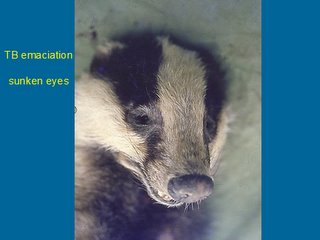 So what about this little darling? Shrunken eyes... dear, dear! And that word again, emaciation...! Nothing a few square meals wouldn't put right... unless he's got TB of course. But then, badgers don't suffer from TB do they? Everybody knows that!
So what about this little darling? Shrunken eyes... dear, dear! And that word again, emaciation...! Nothing a few square meals wouldn't put right... unless he's got TB of course. But then, badgers don't suffer from TB do they? Everybody knows that!Can't be much wrong with him... look, he's smiling!
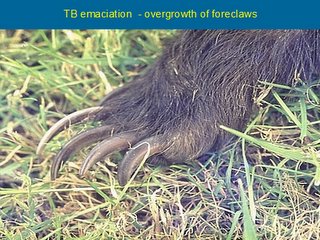 How's this for a "claws 4" moment, then - just what Mr Cameron needs. But not what this little poppet needs. Weakened by TB, he can't dig, so he doesn't wear down his claws.
How's this for a "claws 4" moment, then - just what Mr Cameron needs. But not what this little poppet needs. Weakened by TB, he can't dig, so he doesn't wear down his claws.Surely that cannot be right? Badgers don't suffer from TB. Everybody knows that. And you can't possibly tell a badger has TB just by looking at it... can you? Everybody knows that.
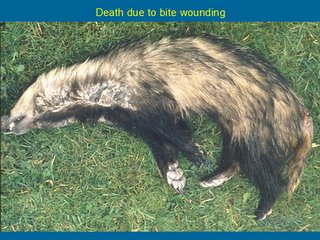 And here's another handsome specimen. How could you possibly have killed such a fine animal like that? That's really shocking, even thinking of killing.
And here's another handsome specimen. How could you possibly have killed such a fine animal like that? That's really shocking, even thinking of killing.Oh! You didn't kill it? It died of bite wounds, after it was driven out by other badgers because it had TB? Don't be silly! Everybody knows that badgers don't suffer from TB. How would other badgers know? Are they vets? (Is there a difference?)
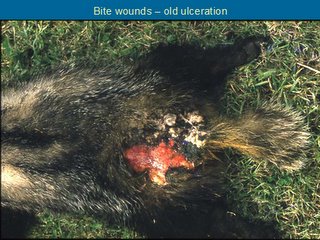 Urgh! How dare you show me that! That's not a badger. Badgers are nice, cuddly creatures with sleek fur. Don't they look lovely!. That can't be a badger. It looks horrid.
Urgh! How dare you show me that! That's not a badger. Badgers are nice, cuddly creatures with sleek fur. Don't they look lovely!. That can't be a badger. It looks horrid.Bite wound and ulcerations? Who would be so nasty. Aren't people cruel! Badgers? Other badgers did it? There should be a law against it. The poor thing should be put down. There's a law against that? How silly!! That's barbaric!
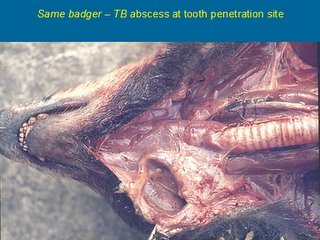 Ohh.. the poor thing! I can hardly bear to look. Those are TB infected absesses? Yuk!!! You mean that poor thing was wandering around with all that inside it? Didn't it suffer?
Ohh.. the poor thing! I can hardly bear to look. Those are TB infected absesses? Yuk!!! You mean that poor thing was wandering around with all that inside it? Didn't it suffer?Oh! I forgot. Badgers don't suffer from TB! Everbody knows that! Who's this "everybody", you ask? National Federation of Badger Groups, I think. They know everything ther is to know about badgers, and they say badgers don't suffer from TB. So it must be right. And then there's the RSPCA. They could't possibly get something like that wrong, could they! Could they?
What did you say they were again? Abcesses? Mmmm.

11 comments:
Thank you for publishing these pictures. It might move the government to 'grasp the nettle' and deal properly with bTB once and for all. The dithering must stop. It will also show those who think badgers don't carry the disease how very wrong they are.
I've written to the lamentable RSPCA about their stance, and copied in Bradshaw and Blair. I doubt if the cowards will reply.
Dear Ms Ballard,
The RSPCA wants its policy examined!
Your political organisation wants to tackle the government "head on" to prevent thousands of badgers being slaughtered, when your same RSPCA did not even tackle this same government from the side when FMD 2001 was raging and slaughtering MILLIONS of healthy animals, which were worth a damn sight more than a badger. You did not offer any fight whatsoever - the RSPCA was a pathetic impotent mute on the sidelines in comparison.
That said, your organisation purports to preventing cruelty and suffering of animals - what is laudable knowing there are thousands of badgers suffering from TB and you do nothing about that? If the government grasp the nettle (as it must) and kills these poor animals, then they kill two birds with one stone (sorry about the pun) whereby they prevent diseased badgers suffering, and they save tens of thousands of cattle from slaughter. The disease might be eventually eradicated with some luck - or at least minimised.
I ask, where were the RSPCA during FMD 2001 - not where you are now, brave and bold enough to defend old brock, some cheap wild animal!
It is NOT senseless preventing the spread of bTB through the humane culling of diseased badgers. I know some healthy ones will die too, but that's too bad I'm afraid in this war against bTB. Too much of the taxpayers money has been thrown away talking, and researching, now the deed must be done.
Yours sincerely,
Captain Bryn Wayt
http://www.rspca.org.uk/servlet/Satellite?pagename=RSPCA/RSPCARedirect&pg=RSPCAHome
Thursday, 2 February: The RSPCA is today tackling the government head-on in a desperate fight to prevent the senseless slaughter of thousands of badgers in England.
I'm not aware that anyone with any knowledge of this disease claims that badgers don't suffer from TB, so I can't quite see the point of this post.
Interesting pictures though; makes a change from the usual pictures you see in the press of badgers dancing over lush green meadows.
I have heard it said too many times: 'badgers don't suffer' from Tb. To a degree that is true, in that for up to 8 years they can maintain body weight, rear cubs and yet still shed buckets of bacteria. The fact remains that for every badger infected, (and the disease is endemic in some populations) those pictures are his/her destiny.
Isolation and starvation while the body is overwhelmed with abscesses(lesions), with no one taking responsibility for controlling the spread of this dreadful disease.
The Wildlife Trust collecting tins would not be so full if these pictures were used on them.
You say you cannot see the point of our publishing the reality of badger with advanced tuberculosis.
We can, which is why they are here.
Mathew did you get these badgers tested for bTB post mortem?
Presumably that would be yes - otherwise how would you know what they died of.
I wonder if you're spending too much time talking to fellow farmers because who else would have said badgers don't suffer from Tb? Could you tell us how you know "that for up to 8 years they can maintain body weight, rear cubs and yet still shed buckets of bacteria"?
I can't see the point of your post either - unless you can give some credence to your claims.
Many times over the last 10 years that I have been involved with the tb debate, I have heard the phrase 'badgers don't suffer from tb', mainly from Wildlife groups. The pictures are of badgers found in farmer's fields. This is the badger farmers dread seeing, as cattle tb follows very quickly. I have also heard both Pauline Kidner and Elaine king argue the toss about infected v. infectious. The RSPCA advert yesterday, said "Badgers are a scapegoat.."
They are not. They are a known reservoir of a disease which affords them a devastating end.
And when they are 'infectious' as opposed to 'infected' (i.e not shedding), the overspill of this highly infectious bacteria affects many other species.
The photographs were provided to us by a veterinary practitioner, and are of badgers, which were positively identified with tb. They had bite wound abscesses, kidney lesions, lung lesions and generalised abscesses throughout the body - and other nasties that tuberculosis inflicts. They were all postive for tuberculosis on culture, and the two main carcasses weighed less than half their normal body weight.
You ask the source of the information re. lifespan, infectivety etc.
All provided by Dr. Cheeseman of Badger Heaven, otherwise known as Woodchester Park - together with other epidemiological 'experts' -either directly or via the 538 Parliamentary questions archived on this site.
To confirm our posting, the PQ's you would need to locate are to be found on: 10 Dec 2003: Column 523W, which enquires into the welfare implications for badgers of allowing the disease to become 'endemic', which was described in an answer 22 March 2004: Column 510W.
Also see 6th Jan 2004: Column 248W, the amount of bacteria excreted is quoted as 'up to 300,000 units of colony forming bacteria per 1ml of urine" from a badger with kidney lesions, and the minmum infective dose for a cow, of this material dribbled onto grassland, is just 0.03ml - 70 colony forming units.
See also 28th January 2004:Column 380W. 29th January 2004: column 483W and Column 485W. and 23rd.March 2004: column 684W for more details.
As to who reads this site, well anyone with more than a passing interest in the health and welfare of cattle, badgers and the countryside in general. The aim was to gather information about bTb from wherever it lurked and present it on one site.
Glad to see that you have evidence that the badgers you picture were identified 'by an expert' as having bTB. Could that same expert explain how it is possible to tell by looking at corpses, and indeed livebadgers, whether or not they are infected/infectious with bTB? (Many farmers claim this is possible)
Could you please provide the reference for the statement "for up to 8 years they can maintain body weight, rear cubs and yet still shed buckets of bacteria"?
Are you surprised how few people have " more than a passing interest in the health and welfare of cattle, badgers and the countryside in general"? (Your webstats would seem to confirm this)
Hello Matthew,
Apologises but as I couldn't find a way of starting a new topic, I'm posting this as a comment.
I've not read your entire Blog but you do seem critical of just about everyone. What strategy would you propose for tackiling bovine TB?
To 'Anonymous' 1. (9.31 am Saturday) Please see our answer to (exactly?!) the same questions you asked. It's in the comment posted above your questions.
To 'Anonymous 2'. You are right. We are very critical of Defra (London) in general and the ISG in particular. We have not too much time for the political posturing of the upper echelons of the RSPCA and their ilk either.
You ask what would we like to see happen. Healthy cattle, healthy badgers. No threat as we walk out of one ban (BSE) of an EU ban on our produce because of Tb status, and no threat in the countryside for walkers, their pets or other indigenous native mammmals and birds.
How do we achieve that?
Over the last 15 - 20 years we've seen how NOT to do it.
If you scroll through this site you will find numerous postings advocating RT-PCR to identify infected environment. It is available, and now its not only American, Australian of even Chinese - it's British. But don't ask me why Defra are looking at that technology with their eyes glazed - ask them. Could be that numerous beneficial job opportunities would be lost if this problem was solved? On the other hand they may just want to get rid a few more farmers. But that doesn't solve the increasingly contaminated environmental exposure caused by untackled wildlife reservoirs, spilling over into other species.
Having experienced the clearance of Tb from the cattle herds in the 50's and studied other country's methods, this site has no problem with the intradermal skin test for cattle. As a herd test it is the prime diagnostic tool world wide. It has the high 90's per cent specitity and sensitivety.
Having put our cattle through almost 30 consecutive 60 day tests (no bought in cattle - all home bred) it sorted out early exposure, and cleared us - once the sick badgers had been removed.
(By Bourne's Krebs team - when they eventually did 'React' which was 3 years after the start of the breakdown - a little slow we thought)
So we support intradermal testing, and slaughter of reactors for cattle. Testing preferably at least every 2 years for all herds until the problem is sorted out. That combined with a post movement test for all cattle not going for direct slaughter or to a dedicated fattening unit.
Pre movement testing as a disease management tool is pretty weak, but it sounds good.
We would favour combining these cattle measures with PCR driven wildlife management of both badgers and deer. We favour leaving a healthy set of badgers as shown by clear cattle tests and preferably PCR back up, to prevent territorial infighting. We would concentrate of leaving 'off sets' to be monitored and gassed regularly. This to pick up the 'dispersers' or the lone badgers that the main social group had excluded.
Any other diagnostic tool (gamma interferon etc.) may be useful 'in the abscence of a wildlife reservoir' to speed up herd clearance. But they still have to pass a skin test. But with the endemic tuberculosis that has been allowed to flourish in our badgers, anything that does not involve tackling the problem from both ends will fail.
Thank you - your summary of how you would tackle TB is very informative. Who do you propose should pay for all these measures, they sound very expensive. Surely not us tax payers? We already contribute £100m plus per year. All the messages I see coming out of DEFRA is that they have less money to spend, not more, so it looks like if you want to clear up this disease it will have to be financed by farmers.
My prediction, which you might want to archive along with all your parliamentary questions, is that government will impose a TB levy on the whole cattle industry, with farmers contributing on a sliding scale depending on their parish testing frequency.
A comment on the RSPCA leaflet on Tb, and description of the disease should be read in conjunction with the above photos.
"its lungs and vital organs were a mass of abscesses and lesions and it must have died in agony"
The RSPCA, once respected for its original and laudable aim of protecting animals from pain and neglect, has taken up a polarised position on TB and is urging its supporters to do the same by means of its urgent Back Off Badgers campaign. Instead of putting the full weight of its now considerable political clout towards persuading the government to get behind the technology already existing to effectively diagnose and eradicate bTB in both cattle and wildlife, the RSPCA is urging the public to object en masse to any idea of a cull. Their fact sheet (Know Your Facts!) includes statements such as "In the few badgers that do have symptoms they are wheeziness and loss of weight and condition. There may be some skin ulceration." The email received yesterday: " A vet friend in Staffordshire did a postmortem on a dead badger found in client's bull pen - its lungs and vital organs were a mass of abscesses and lesions and it must have died in agony - what sort of animal welfare is it that takes - (sometimes) healthy cattle and leaves sick badgers?"
In response to anonymous at 7:23 above with regard £100 million anual funding - if DEFRA or MAFF as was had bitten the bullet earlier and applied common sense to the problem ie culled the wildlife reservoir we wouldn't be facing this expense. BTW the figure was 36.2 million in 2000/01 of which 6.6m was compensation and has risen to 90.5m in 2004/05 with 35m of that as compensation for compulsory purchases of livestock having had contact with a disease spread by an animal which farmers have no legal right to control.
I would like to point out that a lifetime's work put into breeding a pedigree herd is far more than a mere financial investment, and cannot be compensated for.
Post a Comment